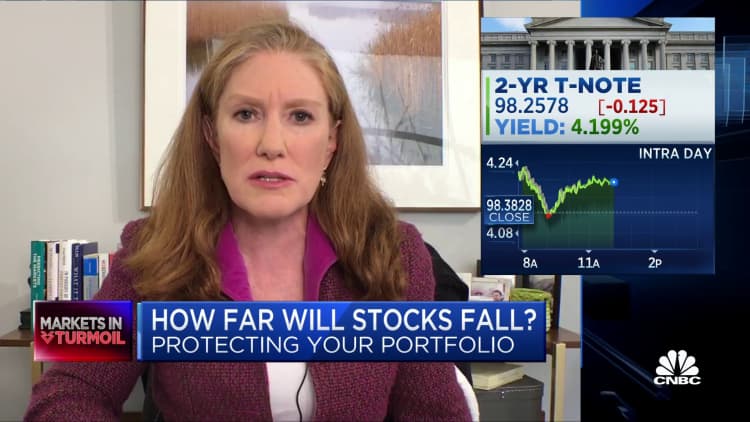It’s very easy to get swayed by headlines and market declines when you don’t know exactly what you’re working on.
Amanda Wallace
Head of Insurance Operations at MassMutual
Meanwhile, a majority of Americans – 80% – are already worried about the impact a recession could have on their day-to-day finances, according to the MassMutual poll. The survey was conducted in August and included 1,000 adults.
Even so, many respondents indicated they were still optimistic about their long-term finances, according to Amanda Wallace, head of insurance operations at MassMutual.
There are steps you can take now to avoid any negative impact a downturn may have on your finances.
It all comes down to creating a solid plan and writing it down, according to Wallace.

“It’s very easy to get swayed by headlines and market declines when you don’t know exactly what you’re working on,” Wallace said.
1. Eliminate unnecessary expenses
Start by assessing your non-essential discretionary spending and decide where you can cut back.
This may include removing subscriptions to streaming television services or print magazines. Maybe you can cut back on food delivery orders or activities your kids no longer enjoy.
Really look at what’s surplus and where you can save so you can find more money to put into an emergency fund, Wallace said.
2. Create an emergency fund
If the economy plunges into a recession, it’s unclear what that might bring. In the worst case scenario, this could include loss of employment or unforeseen medical bills at the worst possible time.
Having money set aside for emergencies can help you work through those uncertainties, Wallace said.
“As a rule of thumb, you should have at least three to six months of living expenses that you can easily access,” Wallace said.
Thana Prasongsin | time | Getty Images
These funds should be kept off the market and in an account where you can access the funds quickly, such as in a money market or high-yield savings account.
“It can help weather the storm without having to dip into retirement assets or use credit cards or high-interest loans,” Wallace said.
3. Pay off the debt
Once your emergency fund has been established and you’ve worked through your budget, it’s time to take your extra cash and pay off balances like high-interest credit cards, Wallace said.
Paying off credit cards usually comes after an emergency fund has been set up, because of the relief the extra money can bring in a downturn, Wallace said. However, it is important to remember that everyone’s situation is different and may require different priorities.
That of the Federal Reserve continued rise in interest rates further increase the cost of outstanding balances. As such, it might be time to look for a 0% interest transfer card if you have good credit, or possibly a low interest personal loan if you don’t. , Matt Schulz, Chief Credit Analyst at LendingTree, previously told CNBC.com. Even asking your current credit card company for a lower interest rate can work.
“Any one of those moves can lower your rates by a lot more than the amount the Fed is raising them on a monthly basis, so that can be a really big thing,” Schulz said.
4. Review your investment allocations
Even though economic fears can send markets into a frenzy, it’s important to stay the course when it comes to your investment plans, Wallace said.
“You shouldn’t stop investing in your 401(k) or any other type of investment plan that helps you prepare for retirement,” Wallace said.
Also take a look at your portfolio investments and 401(k) contributions to make sure you’re not taking on more risk than you think, she said. With that, it’s a good idea to sit down with your partner to make sure your retirement investment strategies are aligned if you’re investing in separate plans.
“You should consult a financial professional if you want to weigh different market scenarios and options and get advice that’s truly personalized for you, your family, and your situation,” Wallace said.
